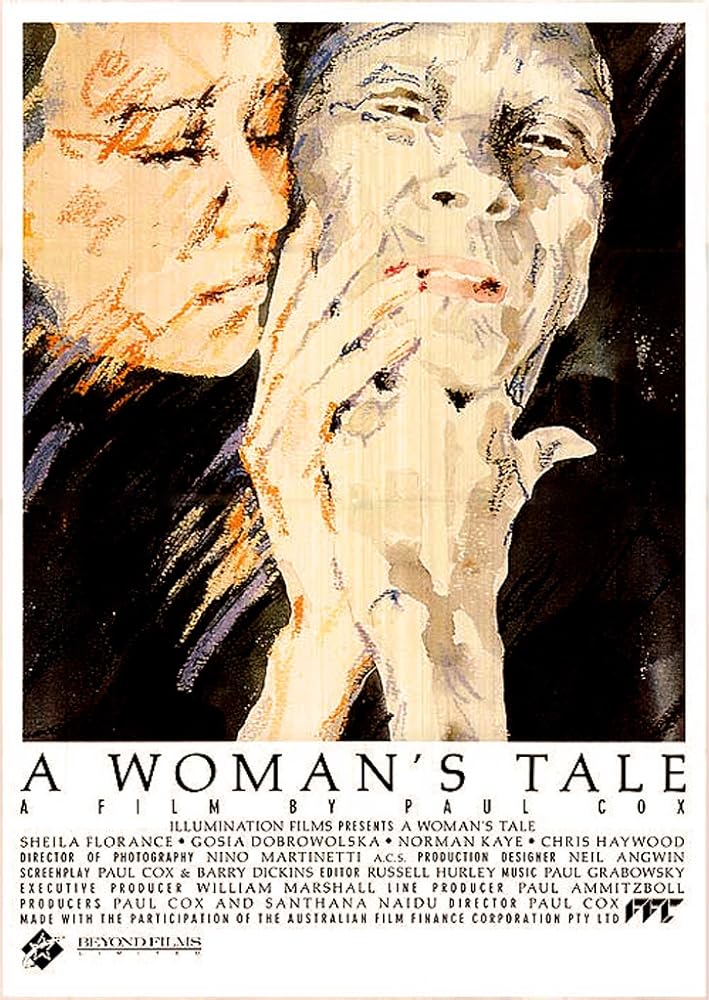
A WOMAN’S TALE
(director/writer: Paul Cox; screenwriter: Barry Dickins; cinematographer: Nino Gaetano Martinetti; editor: Russell Hurley; music: Paul Grabowsky; cast: Sheila Florance (Martha), Gosia Dobrowolska (Anna), Norman Kaye (Billy), Ernest Gray (Peter), Myrtle Woods (Miss Inchley), Chris Haywood (Jonathan), Bruce Myles (Con 1), Alex Menglet (Con 2), François Bernard (Neighbor), Monica Maughan (Billy’s daughter); Runtime: 93; MPAA Rating: PG-13; producer: Santhana K. Naidu/Paul Cox; Orion Home Video; 1991-Australia)
“It’s a special film, never maudlin or anything but honest, about facing adversity and doing it with courage and dignity.”
Reviewed by Dennis Schwartz
Dutch-born Australian director Paul Cox (“Kostas”/”Cactus”/”Lonely Hearts”), an NYU film school grad, helms this observant and heart-warming affirmation of life film. Cox cowrote it with Barry Dickins. The film was written for the great Australian actress Sheila Florance, and is a semi-autobiographical account of her last days (using a fictional character to thinly disguise her story; Florance died four days after winning an Australian best actress Oscar for the role). Florance endows the film with a special spiritual glow as she plays the 78-year-old central character Martha, a feisty eccentric who has terminal cancer but despite being in pain chooses to live alone in her cluttered small Melbourne rental apartment with her books, paintings, and a parakeet named Jesus and a cat named Sam. The kindhearted and defiantly independent-minded Martha is cared for by saintly nurse Anna (Gosia Dobrowolska), looked after by her well-meaning but puzzled son Jonathan, and enjoys the company of next-door neighbor Billy (Norman Kaye). He’s a former RAF medal winning pilot, who is elderly, incontinent, frail and almost senile. The old geezer is alert enough to try and cop a feel from a bemused Anna as she shaves her rather harmless patient.
Besides the pain, Martha has to put up with an always complaining embittered neighbor in the flat below, a nasty landlord who wants her out so he can raise the rent and her son’s clueless insistence that she go into a nursing home. The open-minded Martha greets the local prostitute with a friendly hello and allows her nurse to use the apartment for the affair she is having with a shy married man named Peter. Martha’s positive life experiences are riddled with guilt feelings when haunted memories come back of her not being home when the Germans during the war bombed her house and her 10-month-old daughter was killed. Also her attempts to be helpful are not always understood, as when she tries to comfort a 16-year-old girl who is suicidal who called a late-night talk show and after offering her love and support the teenager hangs up without accepting a tearful Martha’s offer.
This is another one of Cox’s brilliant art-house films that gives voice to those who are compassionate, victimized, open-minded, have bad landlords, are able to take responsibility for their own lives, and who offer no apologies for growing old and still being alive. It’s a special film, never maudlin or anything but honest, about facing adversity and doing it with courage and dignity.
REVIEWED ON 8/27/2007 GRADE: A